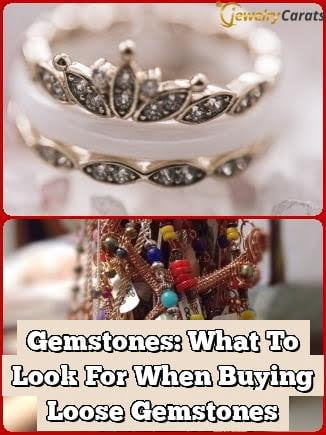When it comes to jewelry, most people immediately think of finished products such as rings, necklaces, and bracelets. However, an often overlooked aspect of the industry is the buying and selling of loose gemstones. These precious stones play a vital role in creating stunning jewelry pieces and are sought after by both jewelry stores and collectors alike.
But do jewelry stores buy loose gemstones? In this article, we will explore the answer to that question, as well as delve into the value of loose gemstones, the criteria that jewelry stores consider when purchasing them, and the benefits for individuals looking to sell their own gemstones.
Loose gemstones hold immense value in the world of jewelry due to their versatility and unique qualities. Unlike pre-set gemstones found in finished pieces, loose gems offer more freedom for customization and creativity. Jewelry artisans often search for high-quality loose gemstones to bring their design ideas to life.
Additionally, collectors are always on the lookout for rare or unusual specimens that can add value to their personal collections. Therefore, it is not surprising that jewelry stores are willing buyers when it comes to loose gemstones.
Understanding the value of loose gemstones goes beyond their physical attributes alone. Factors such as rarity, quality, color intensity, cut precision, and carat weight all contribute to a stone’s desirability and market price. Jewelry stores recognize that these precious gems are highly sought after by customers who appreciate beauty and seek one-of-a-kind pieces.
By offering loose gemstones for sale alongside finished jewelry items, jewelers can cater to a broader range of customers with diverse tastes. Moreover, having a selection of loose gemstones allows jewelers to assist clients in customizing their own unique creations.
With this understanding of their significance in mind, let us now explore why jewelry stores choose to buy loose gemstones and what factors they consider when making purchasing decisions.
Understanding the value of loose gemstones
Gemstones hold immense value in the jewelry industry, attracting both jewelry stores and collectors. Understanding the significance of loose gemstones helps shed light on why they are sought after by both parties.
Rarity
One of the main reasons why loose gemstones are highly valued is their rarity. Certain gemstones are incredibly rare, making them highly desirable for collectors and allowing jewelers to create unique and exclusive pieces. For example, natural colored diamonds or rare varieties such as alexandrite or padparadscha sapphire command high prices due to their scarcity. Jewelry stores understand that offering customers rare and exceptional gemstones can set them apart from competitors and attract discerning buyers.
Customization
Loose gemstones offer a world of possibilities for jewelry designers and stores when it comes to customization. Unlike pre-set stones in jewelry pieces, loose gemstones provide flexibility and creative freedom to design custom-made pieces that cater to individual preferences. Jewelers appreciate the opportunity to create unique designs using loose gemstones that fit different settings, cuts, sizes, or colors according to their clients’ desires.
Investment
Another reason why jewelry stores show interest in purchasing loose gemstones is their potential as an investment asset. Gemstones have a history of retaining value and even appreciating over time, making them attractive for investors looking for alternative investments beyond traditional stock markets or real estate. Collectors often acquire loose gemstones with the intent of holding onto them as an investment or selling them at a later date when their value may increase significantly.
For collectors, acquiring loose gemstones allows them to build personalized collections showcasing various types and colors of gems – from vibrant emeralds to flawless diamonds or mesmerizing opals. Additionally, possessing loose gemstones that possess exceptional qualities such as rarity, size, clarity, color saturation can be regarded as prestige items within the collector community.
Overall, the unique qualities and allure of loose gemstones make them highly sought after by jewelry stores and collectors alike. Understandably, this demand drives individuals to explore selling their loose gemstones to jewelry stores for various reasons, whether it is to obtain a fair price or make room for new additions to their collection.
The criteria for jewelry stores to consider when buying loose gemstones
When jewelry stores are considering buying loose gemstones, there are several key factors that they take into account. These factors help determine the value and desirability of the gemstone, and ultimately influence whether or not the jewelry store will make a purchase.
- Quality: The quality of a loose gemstone is one of the most important factors for jewelry stores when making a buying decision. This includes evaluating the gemstone’s color, clarity, cut, and carat weight. Gemstones with vibrant and intense colors are highly sought after, as well as those with high levels of clarity and precision cuts.
- Rarity: Jewelry stores are often drawn to rare gemstones that are difficult to find in the market. Gemstones that have limited availability or are sourced from specific locations can command higher prices due to their scarcity. Rarity adds exclusivity and value to a loose gemstone, making it more appealing for potential buyers.
- Authenticity: It is crucial for jewelry stores to verify the authenticity of a loose gemstone before purchasing it. They may rely on certifications from reputable gemological laboratories to ensure that the gemstone is genuine and accurately represented in terms of its characteristics such as color grade or clarity grade. Proof of authenticity provides confidence to jewelry stores and their customers.
- Market Demand: Jewelry stores consider current market trends and consumer preferences when deciding which types of loose gemstones to purchase. They want to ensure that there is sufficient demand for a particular type of gemstone in order to sell it successfully in their store.
- Potential Profit Margins: Lastly, jewelry stores analyze potential profit margins when purchasing loose gemstones. They assess various factors such as the cost they acquire the stone for, any additional costs involved in setting it into jewelry (such as labor or other materials), and projected retail prices based on market demand and competition.
By considering these criteria, jewelry stores can make informed decisions when buying loose gemstones that align with their business goals and customer preferences. It is important for individuals looking to sell their loose gemstones to be aware of these factors in order to understand how their gemstones may be valued by jewelry stores.
The benefits of selling loose gemstones to jewelry stores
Selling loose gemstones to jewelry stores can offer several advantages for individuals looking to sell their gemstones. This section will explore the benefits of selling loose gemstones to jewelry stores and why it can be a lucrative option for sellers.
- Reputable Buyers: Jewelry stores are trusted and established businesses in the industry. Selling your loose gemstones to these stores ensures that you are dealing with reputable buyers who have knowledge and experience in assessing the value of gemstones. This can provide sellers with peace of mind, knowing that they are getting a fair price for their gemstones.
- Convenience: Selling loose gemstones to jewelry stores is a convenient option for individuals who may not have the time or expertise to find individual buyers. Jewelry stores typically have a constant demand for gemstones, making it easier for sellers to find potential buyers quickly. Additionally, selling to jewelry stores eliminates the need for advertising, negotiating with multiple buyers, or setting up online listings.
- Potential for Higher Prices: Another advantage of selling loose gemstones to jewelry stores is the potential for higher prices compared to private buyers or other avenues. Jewelry stores often have a broader customer base and access to multiple distribution channels, which allows them to sell the gemstones at competitive prices. This means that sellers may be able to negotiate better deals and receive higher offers from jewelry stores.
- Immediate Payment: When selling loose gemstones to jewelry stores, sellers often receive immediate payment upon reaching an agreement on the price. This can be particularly advantageous if you need quick cash or want immediate satisfaction from your sale.
It is important for sellers to research and approach reputable jewelry stores when considering selling their loose gemstones. Conducting some market research and obtaining multiple offers from different jewelers can help ensure that you get the best possible deal for your precious gems.
How to approach jewelry stores with the intent of selling loose gemstones
Approaching jewelry stores with the intent to sell loose gemstones can be a daunting task, especially for those who are unfamiliar with the process. However, with proper preparation and knowledge, it is possible to have a successful transaction. This step-by-step guide will provide valuable insights and tips on how to approach jewelry stores and negotiate for the sale of your loose gemstones.
- Research and prepare: Before approaching any jewelry store, it is essential to do thorough research about the current market value of your loose gemstone. This will help you gauge a fair price for your gemstone and ensure that you are not selling it below its worth. It is also important to gather any relevant documentation or certificates that authenticate the quality or origin of your gemstone.
- Identify potential buyers: Once you have done your research, make a list of reputable jewelry stores in your area or online platforms that specialize in buying loose gemstones. Look for stores that have a track record of dealing with such transactions and positive customer reviews. Consider reaching out to multiple stores to increase your chances of finding a buyer who offers the best price.
- Approach the store: When approaching the jewelry store, make sure to dress presentably and be confident during your interaction. Start by introducing yourself and clearly stating your purpose – selling your loose gemstone. Provide any relevant information about the gemstone, such as its type, carat weight, color, cut, clarity, and any certificates you may have. Be honest about any known flaws or treatments applied to the gemstone.
- Negotiate and explore options: After presenting the details of your loose gemstone, be open to negotiation with the store representative. They may ask questions or request additional information about the gemstone’s history or source. Listen attentively and respond truthfully while also expressing any specific expectations regarding pricing or payment terms.
| Step | Description |
|---|---|
| Research and prepare | Thoroughly research the market value of your loose gemstone and gather any relevant documentation. |
| Identify potential buyers | Create a list of reputable jewelry stores or online platforms that specialize in buying loose gemstones. |
| Approach the store | Introduce yourself, clearly state your purpose, provide information about the gemstone, and be honest about any flaws or treatments. |
| Negotiate and explore options | Be open to negotiation, listen attentively, and express any specific expectations regarding pricing or payment terms. |
Remember, it is important to approach each interaction with patience and flexibility. Selling loose gemstones can be a time-consuming process as different stores may offer various price ranges based on their own evaluation criteria. By following this step-by-step guide and being prepared for negotiations, you will increase your chances of finding a jewelry store willing to purchase your loose gemstone at a fair price.
Tips for ensuring a fair price when selling loose gemstones to jewelry stores
When selling loose gemstones to jewelry stores, it is important to ensure that you are getting a fair price for your valuable stones. Here are some tips to help you negotiate and get the best deal possible:
- Research the market: Before approaching any jewelry store, it is crucial to research the current market value of your gemstones. This will give you an idea of what to expect when selling and help you negotiate a fair price. Look for recent sales of similar gemstones and compare prices from multiple sources to get a realistic estimate.
- Get your gemstones appraised: To have a better understanding of the quality and value of your loose gemstones, consider getting them professionally appraised by a certified gemologist. This will provide you with an official document that can be presented to jewelry stores as evidence of the stone’s worth.
- Present your gems attractively: When meeting with potential buyers, it is important to present your loose gemstones in an appealing manner. Clean them properly and consider displaying them in a velvet or silk pouch or box. Providing detailed information about the origin, cut, clarity, carat weight, and any certifications can also make a positive impression on buyers.
- Be prepared to negotiate: Negotiation is key when selling loose gemstones. Jewelry stores often offer lower prices initially but be confident in expressing the value and uniqueness of your gemstones during negotiations. Consider having a minimum acceptable price in mind before starting negotiations so that you know when it’s time to walk away if the offer does not meet your expectations.
- Seek multiple opinions and offers: Don’t settle for just one offer from one jewelry store. It is advisable to approach multiple jewelry stores or even consider consulting online platforms that specialize in buying loose gemstones. By comparing different offers, you can ensure that you are getting the best possible price for your stones.
| Tips | Description |
|---|---|
| Research the market | Before approaching any jewelry store, it is crucial to research the current market value of your gemstones. |
| Get your gemstones appraised | To have a better understanding of the quality and value of your loose gemstones, consider getting them professionally appraised by a certified gemologist. |
| Present your gems attractively | When meeting with potential buyers, it is important to present your loose gemstones in an appealing manner. Clean them properly and consider displaying them in a velvet or silk pouch or box. |
By following these tips, you can ensure that you are receiving a fair price when selling your loose gemstones to jewelry stores. Remember that each stone is unique, so take the time to thoroughly research and understand its value before entering into negotiations. With patience and persistence, you can secure a deal that meets both your needs and the expectations of the jewelry store buyer.
Common misconceptions about jewelry stores buying loose gemstones
Many people believe that jewelry stores are not interested in buying loose gemstones, assuming that they only acquire complete pieces of jewelry. However, this is a common misconception in the industry. In reality, jewelry stores do buy loose gemstones for a variety of reasons.
One common myth is that jewelry stores only purchase loose gemstones if they are of exceptional quality or rare. While it is true that certain stores may focus on acquiring high-quality or rare stones for their collections, many jewelry stores also buy loose gemstones of various grades and types. They understand that there is a market for all kinds of gemstones, from precious gems like diamonds and sapphires to semi-precious stones like amethysts and topazes.
Another misconception is that jewelry stores only buy loose gemstones from wholesalers or dealers in the industry. While it is true that many professionals in the trade prefer to work with established suppliers, there are still plenty of opportunities for individuals to sell their loose gemstones directly to jewelry stores. Some smaller, independent stores may be more inclined to purchase directly from individuals, especially if they have unique or interesting stones.
Furthermore, some people assume that selling loose gemstones to a jewelry store means settling for a low price. However, this is not always the case. Jewelers understand the value of loose gemstones and are willing to pay fair prices based on factors such as the quality, cut, color, clarity, and carat weight of the stone. It’s important for sellers to educate themselves about these criteria so they can negotiate effectively with jewelry store buyers.
By dispelling these common misconceptions about selling loose gemstones to jewelry stores, individuals who possess these precious commodities can open themselves up to new opportunities for selling their stones at fair prices. Whether you have inherited loose gemstones, acquired them through personal collections, or have loose gemstones that were once part of jewelry but are no longer needed, there is a potential market waiting for you in jewelry stores.
Exploring alternate avenues for selling loose gemstones
Online platforms
In addition to selling loose gemstones to jewelry stores, individuals also have the option of exploring online platforms as an alternative avenue for selling their precious stones. Online platforms provide a convenient and accessible way to connect with potential buyers from all over the world, expanding the market reach and increasing the chances of finding interested parties.
There are various online marketplaces specifically dedicated to buying and selling loose gemstones, such as Gem Rock Auctions, Etsy, and eBay. These platforms allow users to create listings showcasing their gemstones along with detailed descriptions and high-quality photographs. Sellers can set their own prices or engage in bidding processes, giving them control over the selling process.
When choosing an online platform, it is important to research and select reputable websites that have a strong track record of facilitating successful transactions. Reading reviews and testimonials from past users can provide valuable insights into the platform’s reliability, customer service, and overall user experience.
Auctions
Auctions can be another effective avenue for selling loose gemstones. Participating in auctions allows sellers to showcase their gemstones to a wide audience of potential buyers who may be willing to competitively bid on the stones, driving up the final price.
There are different types of auctions available, including live auctions held at physical locations as well as online auctions. Live auctions often feature professional auction houses that specialize in handling valuable items like gemstones and jewelry. Online auction platforms like Sotheby’s or Christie’s also provide opportunities for sellers to reach a global audience.
It is advisable for sellers considering auctions as an option to do thorough research on the auction house or platform they plan to use. Understanding their commission fees, terms and conditions, as well as their reputation within the industry will help ensure a smooth selling experience.
Other Options
Apart from jewelry stores, online platforms, and auctions, there are other avenues available for selling loose gemstones. These include:
- Gemstone wholesalers: Selling directly to wholesalers can be a viable option for those who have a large quantity of loose gemstones to sell.
- Private collectors: Some individuals may prefer to sell their gemstones directly to private collectors who have a specific interest in acquiring unique and rare stones.
- Gemstone trade shows: Trade shows dedicated to the jewelry and gemstone industry provide a platform for sellers to showcase their gemstones and connect with potential buyers, including jewelry store owners, collectors, and enthusiasts.
It is important for sellers to carefully consider the pros and cons of each alternative avenue before deciding which is the best fit for their needs. Factors such as convenience, time frame, potential profit margins, and personal preferences should all be taken into account when exploring these options.
Conclusion
In conclusion, selling loose gemstones to jewelry stores can be a lucrative and advantageous option for individuals looking to part ways with their precious stones. Throughout this article, we have discussed the significance of loose gemstones in the jewelry industry and why they are sought after by both jewelry stores and collectors. We have also explored the criteria that jewelry stores consider when purchasing loose gemstones, as well as the benefits of selling to them.
One key point to remember is that approaching jewelry stores with the intent of selling loose gemstones requires careful research and preparation. By following a step-by-step guide and utilizing negotiation skills, individuals can increase their chances of getting a fair price for their gems. Additionally, we provided tips on how to ensure a favorable deal when selling to jewelry stores.
It is important to address common misconceptions about jewelry stores buying loose gemstones. Contrary to popular belief, many jewelry stores do purchase loose gemstones for various reasons such as creating custom pieces or adding value to existing jewelry. Therefore, individuals should not hesitate in exploring this avenue for selling their precious stones.
While selling loose gemstones to jewelry stores is a viable option, it is worth considering alternate avenues as well. Online platforms and auctions provide additional opportunities for individuals to sell their gemstones. Exploring these options may help individuals find the best market for their specific type of stone.
Frequently Asked Questions
How do I sell my loose gemstones?
Selling loose gemstones can be done through various channels. One option is to sell them online through platforms specifically designed for gemstone trading. These platforms provide a convenient way to connect with potential buyers who are actively searching for gemstones.
Another avenue is to approach local jewelry stores or gemstone dealers. Depending on the rarity and quality of your gemstones, they may be interested in purchasing them directly from you. Additionally, participating in gem and jewelry shows or exhibitions can also be an effective way to showcase and sell your loose gemstones.
Can you sell gemstones to jewelers?
Yes, many jewelers are open to buying gemstones from individuals. However, it’s important to keep in mind that not all jewelers may be interested in purchasing loose gemstones, particularly if they specialize in designing their own jewelry or only work with specific suppliers.
It’s recommended to research and approach jewelers who are known for dealing with loose stones or have a history of buying from individual sellers. Prioritize establishing a personal connection as it can help build trust and increase the likelihood of making a successful sale.
Is there a market for loose gemstones?
Loose gemstones have a market of their own within the world of gems and jewelry. Many people prefer purchasing loose stones as it allows them more flexibility in terms of custom designs and personal preferences. The demand for loose gemstones comes from a variety of sources, including independent jewelers, collectors, hobbyists, and individuals looking to create personalized pieces of jewelry.
This market extends beyond local buyers – there are also international buyers who actively seek out unique and rare gemstones that may be difficult to find elsewhere. However, it’s important to note that finding the right market for your particular type of loose gemstone may require some research and networking within the industry.

Welcome to my jewelry blog! My name is Sarah and I am the owner of this blog.
I love making jewelry and sharing my creations with others.
So whether you’re someone who loves wearing jewelry yourself or simply enjoys learning about it, be sure to check out my blog for insightful posts on everything related to this exciting topic!





